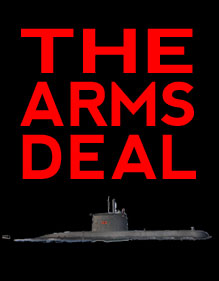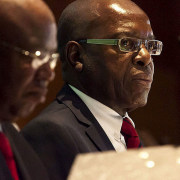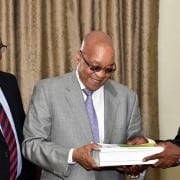|
Getting your Trinity Audio player ready...
|
 By Lee-Ann Alfreds
By Lee-Ann Alfreds
The Arms Procurement Commission is ending as it started – dogged by resignations.
One year almost to the day after it was forced to delay the start of public hearings because of the resignation of one of its commissioners, the Seriti Commission – which is probing allegations of graft and corruption in South Africa’s multi-billion arms deal in 1999 – is having to fend off questions around its reputation and integrity after two senior staff members quit.
The commission confirmed late last month in a statement that two evidence leaders, advocates Barry Skinner and Carol Sibiya, had resigned.
But commission spokesman William Baloyi insisted the resignations would not interrupt the commission's work. “The Commissions (sic) operations will not be interrupted as they were working within a team that is fully informed and will proceed with the responsibilities,” he said in the statement.
The Times newspaper had earlier reported that Skinner and Sibiya had claimed in their 15-page resignation letter that they were being treated disrespectfully by the commission's head of legal research, advocate Fanyana Mdumbe. Baloyi would not confirm the reason for their resignations because “they are the subjects of ongoing engagement with the commission”.
However Skinner and Sibiya are simply the latest in a series of resignations that has rocked the Seriti Commission since it was established by President Jacob Zuma in October 2011.
High staff turnover
Judge Willem van der Merwe, one of the original three commissioners appointed by Zuma, resigned in 2011 for personal reasons, immediately after being appointed. He was replaced by Free State judge president Hendrick Musi.
Then senior commission investigator Norman Moabi quit in January 2012, alleging in a letter leaked to Beeld newspaper that the commission was not being transparent and concealed an alternative or “second agenda”. In the letter, Moabi – a lawyer and former acting judge – claimed chairperson Judge Willie Seriti ruled the commission with an iron fist and facts were manipulated or withheld from commissioners. Contributions from commissioners who did not pursue the “second agenda” were frequently ignored. He also accused Seriti of having a "total obsession" with the flow of information at the commission.
A month later, Seriti's executive assistant approached the general public service bargaining council seeking arbitration after her resignation attempt, the Sunday Times reported. Her unhappiness with the commission allegedly centred on the commission's office manager, widely thought to be related to Seriti by marriage.
In May 2012 Mvuseni Ngubane, a respected Durban advocate and the Seriti Commission’s secretary, was found dead in his car, apparently by his own hand. However, his suicide is not thought to be related to the commission.
Principal legal researcher Kate Painting left in March 2013. She later revealed that it was due to what she also termed a “second agenda”.
“When the commission's work commenced in earnest I was one of two legal professionals. We were virtually tasked with setting up the commission. I went on fact-finding trips overseas and initially believed we would fulfill our mandate; another agenda soon emerged, as did an obsessive control of information, family relationships and incompetent administration," Painting said in a statement released to the Mail & Guardian in August 2013. "Fear is a common theme at the commission and any non-compliance with the second agenda is met with hostility."
But it was the resignation of commissioner Judge Francis Legodi in August last year, just before the public hearings were scheduled to start, that made the public sit up and take notice. The Mail & Guardian reported that sources indicated that Legodi “is known to have been unhappy with the secrecy surrounding the workings of the commission, the covert handling of the documentation, and the fact Seriti ruled with ‘an iron fist’.”
Responding to the resignations, Seriti told Beeld it would not affect the integrity of the commission, saying the hearings were public and anyone could judge the process for themselves and examine the evidence placed before the commission. Asked whether his management style had influenced the resignations, Seriti told the newspaper: "Everyone has their own management style, and I have mine."
Zuma did not replace Legodi and the commission proceeded with only two commissioners.
A day after Legodi resigned, chief evidence leader Advocate Tayob Aboobaker – one of the 10 advocates and attorneys hired to lead the evidence of the witnesses – submitted his resignation, but later retracted it.
The Sunday Times reported that Aboobaker – who made the opening statement when the hearings got underway – criticised the commission for nepotism, lack of professionalism and infighting in his resignation letter, which the newspaper said it had seen. "I cannot operate in an environment which is so suffocating," he reportedly wrote.
Aboobaker finally quit in April this year. In a statement, the commission insisted “his departure was not as a result of disagreements with Judge Seriti”.
Resignations will not affect commission’s work
That appeared to be it for the beleaguered commission – until Skinner and Sibiya drew the rug out from under them … again.
But independent defence analyst Helmoed Heitman indicated this week that he did not believe the resignations would have any impact on the work of the commission, except to possibly damage its reputation.
“I don’t think it will have a major effect, in large part because I don’t think the commission will have a major effect,” he told Corruption Watch. “It’s too late for the commission. If they stole anything, they have buried the evidence very deep.”
Heitman pointed out that his investigations had led him to conclude that there was no large-scale corruption in the selection and purchase of the equipment. ”There was no major corruption in the system, I know what was selected, we paid market price or less,” he said. “In three out of the five instances, we bought the cheapest or the second cheapest. In the case of the Hawks (jet trainer aircraft), if you took the military value, the Hawk won. The bottom line is there wasn’t corruption in the selection.”
But he admitted that there could well have been corruption in the industrial participation (the investment the arms manufacturers were supposed to make in the local economy) aspects of the deal.
“The DIP (defence industrial participation)/NIP (national industrial participation), if there was going to be anything crooked in that deal, I would look there. It would never appear on the arms deal side, it was never added to the price. If there was crookery it was over there. (But) as far as I was aware they (the commission) are not looking at that.”







